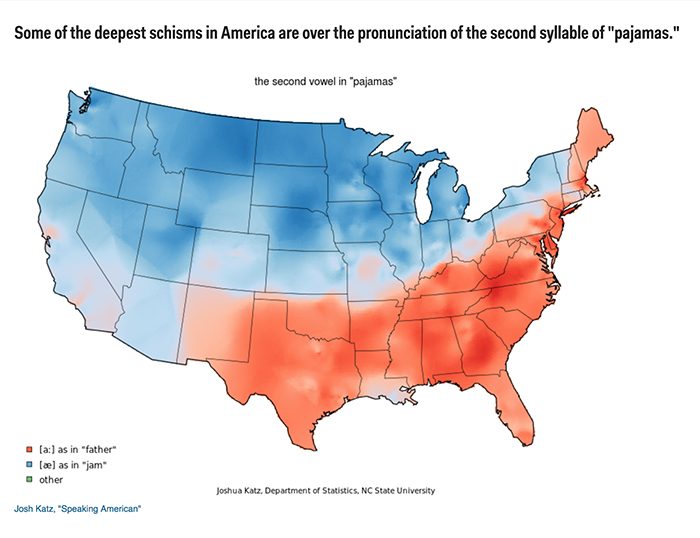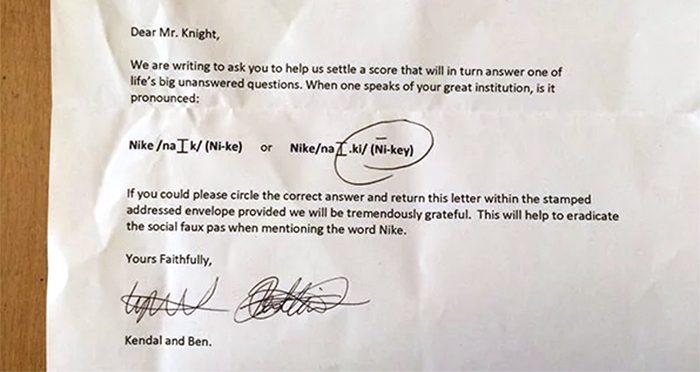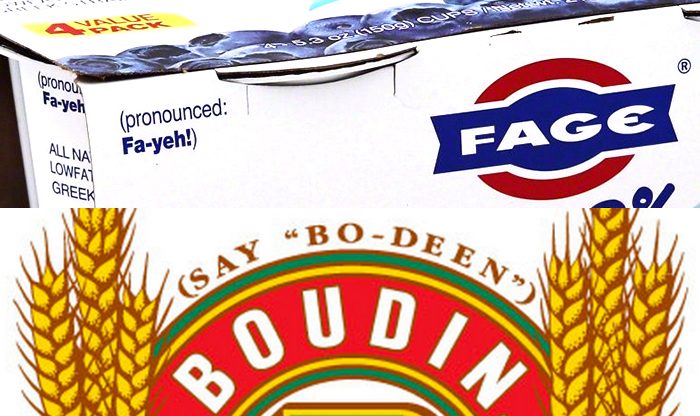Someone Will Pronounce Your Name Wrong. And that’s fine.
Seriously. Mispronunciation of your name isn’t the worst thing that could happen to your company, it’s not even close.
Like most people, you’re probably thinking about your brand or product as some singular, perfect project – and that makes sense, you’ve been working on it for years. No matter the amount of effort you’ve put into perfecting every part of your brand, someone is going to misinterpret some element of it. That’s okay. Billion dollar companies have thrived in the face of these issues.
Universal pronounceability is a fool’s errand
Pronounceability is perceived to be a big part of naming and it’s often something we get asked about. Some of our clients start the naming process by lining up hoops for their name to jump through – length, spelling, pronounceability. They tend to want a name that is “easy to pronounce,” and they sometimes wonder out loud about names that people the world over might be able to pronounce. Well, A Hundred Monkeys has been in the naming business for nearly 30 years, and we’ve learned that pronounceability is very subjective. Have you heard someone from South Jersey say “water”? A native Italian say “squirrel”? A pure maple Vermontian say the name of their state? Beyond mere domestic disagreements on pronouncing words, researchers at the Max Planck Institute for Psycholinguistics found that in a study across 31 countries the only universal expression they could find was “huh?” and even that wasn’t always pronounced the same.
As a country, the United States can’t even agree on how to pronounce “pajamas.” It’s highlighted as one of the deepest schisms in the book, “Speaking American” by The New York Times’ Josh Katz.

The world mispronounces billion dollar company names everyday
There are thousands of words that Americans pronounce differently everyday and we’re all still able to conduct business and go about our lives. “But a name like Coca-Cola operates differently from everyday words,” some might contend. Not really. Unless you’re in the fashion industry, odds are you “mispronounce” Givenchy. No bother, they’re part of a $120 billion market cap conglomerate. “But that’s a random, luxury, foreign surname!” Okay, how about the fact that the world is divided on how to say Nike and Adidas. If this is the first you’re hearing about these athletic apparel pronunciation differences, then it says something about pronounceability issues: they’re less of a big deal than you thought they were and, as we were saying, they don’t affect business.
Should a brand care if someone pronounces their company or product’s name “wrong” on principle? It really depends. If you’re overly prescriptive, or even get agitated over it, then you may alienate fans of your brand. Remember that some people may be phonetically incapable of pronouncing your name in certain parts of the world – some people don’t even use the same alphabet for that matter. We find it endearing, and simply polite, when CEOs like Moleskine’s Arrigo Berni openly embrace multiple pronunciations of their name. Do you think a paper company with a name that is pronounced a dozen different ways is doing well in this “tech age” of short names? Yep. The brand has achieved “cult status” in its 24 years of existence with sales of $156 million in 2016 – and nearly every country in Europe pronounces “Moleskine” differently. It’s smart, it’s wordly, it’s welcoming for a brand to say: “Hey! Say our name however you like, we still love you.”
“We want people to feel free to say the name the way they want. Having said that, “moleskin” as a word is originally [a British] word. So the [British] pronunciation is ‘Mole-skin.’ But then you know, it was moved to France and over there, an ‘e’ was added and the French pronunciation is ‘mol-ey-skine.'”
— Arrigo Berni, Moleskine CEO
On the other hand things can get a little squirrely if you try to be too prescriptive about how to pronounce your brand name. At best it comes off as nit-picky or superfluous, and at worst it comes off as elitist and alienating. If you’re going to go that route, take a cue from Phil Knight, the co-founder and chairman emeritus of Nike. He famously responded to two British designers who sent him a cold letter asking if it was pronounced “ni-key” or “nike” (like bike). Phil circled the former on a sheet of paper, and that was that. Does that mean the kids playing sports in the suburbs of Les Ulis, the shadows of the Maracanã, and the parks of Guadalajara are going to immediately change their tune? No. He didn’t give a speech, or lay out enunciation rules, he quietly answered the question and moved on.

From Nokia to IKEA there are plenty of other companies who are founded in foreign countries and have their names “mispronounced” in the United States. I’d bet my bottom euro you’ve never said Nokia like the Finns do, or noticed that IKEA is actually an acronym (designed for their dyslexic founder to be able to remember the name). While some brands are confident in their reach and durability, others come off frail and desperate for you to get every syllable right – even including pronunciation instructions on their packaging and websites. For every Fage (“Fa-yeh!”) or Boudin (“Bo-deen”) that feels like they have to hold your hand when teaching you how to pronounce their name, there are another three companies focusing their energies elsewhere to evolve their product or offering. It’s probably not a good idea to waste time, money, ad copy, or your customers’ attention on coaching perfect pronunciation when they’re experiencing 10,000 brand messages a day.

Porsche has two syllables. And no one cares.
While you may want to stay away from certain barriers when people say your brand name out loud or in their head, pronounceability should be one that you take very lightly. If you create too many rules to “enable” pronounceability (which is, as we’ve mentioned, a fool’s errand), you’ll wind up with bland, predictable, borderline-unprotectable names that don’t inspire or connect with your audience. It’s important to know where to draw the line and bear in mind all of the instances successful brands – and brands you love – didn’t care if their name was a little curious or confusing. Do you think that Arc’teryx or Hermès lose sleep over how you pronounce their names?
You’re pronouncing way more companies “wrong” than you thought. But that’s okay.
So, even if it feels bold, or a little scary, give a second chance to the interesting parts of language that get snubbed because someone might not be able to spell or pronounce it perfectly at first go. There are treasure troves of names in those corners of our brains if you’re willing to take a look.

